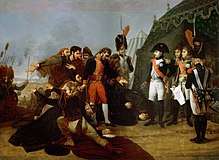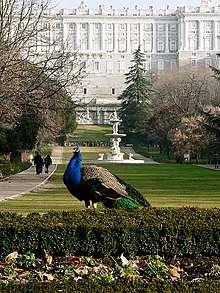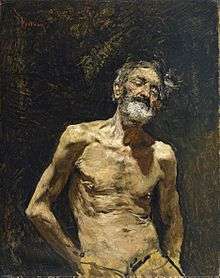
Antoine-Jean Gros, Surrender of Madrid, 1808. Napoleon enters Spain's capital during the Peninsular War, 1810

Campo del Moro Gardens, Royal Palace of Madrid. Spain.

Nude Old Man in the Sun, 1871, Mariano Fortuny y Marsal.
The 19th century (1 January 1801 – 31 December 1900) was the century marked by the collapse of the Spanish, Napoleonic, Holy Roman and Mughal empires. This paved the way for the growing influence of the British Empire, the Russian Empire, the United States, the German Empire, the French colonial empire and Meiji Japan, with the British boasting unchallenged dominance after 1815. After the defeat of the French Empire and its allies in the Napoleonic Wars, the British and Russian empires expanded greatly, becoming the world's leading powers.
Quotes
- En el Siglo XIX, con el impacto de la revolución industrial y con la aparición de la democracia, se estancó el pensamiento político. Surgieron filosofías que siguen vigentes, que en muchos casos están plagadas de falacias, de estructuras lógicas engañosas que llevan a conclusiones erradas.
- In the 19th century, with the impact of the industrial revolution and with the emergence of democracy, political thought stalled. Philosophies have emerged that are still in force, which in many cases are plagued by fallacies, of misleading logical structures leading to wrong conclusions.
- Jaime Durán Barba, La política en el siglo XXI: Arte, mito o ciencia. Editor Penguin Random House Grupo Editorial Argentina, 2017. ISBN 9873752730.
- Europe changed more rapidly and more radically during the nineteenth century than during any prior period. Perhaps most fundamentally, its population more than doubled, from 205 million in 1800 to 414 million in 1900, not counting the 38 million who emigrated to others parts of the world in the course of the century. The economy grew even faster, as the per capita Gross National Product (GNP - i.e. the total economic output for every European) increased by 120 per cent between 1830 and 1913. More visible to the contemporaries than the apparently modest rates of annual growth that underlay this secular figure was the communications revolutions. In 1800 the wealthy travelled by horse-drawn carriage and the poor walked; in 1900 the wealthly travelled first class on the railway or were driven in their own automobiles, while the poor travelled third class on the railway and by omnibus, train or underground railway.
- Oxford University, in The Nineteenth Century: Europe 1789-1914, edited by T. C. W. Blanning, p. 1. Editor Oxford University Press, 2000. ISBN 0198731353.
- Messages had long been travelling above ground thanks to the invention of the tellegraph in the 1830s and the telephone in the 1870s. The more earth-bound written world was also spread further and faster than even before, as the mechanized printing presses and paper-making machines brought the unit cost of newspaper within reach of working-class pockets.
- Oxford University, in The Nineteenth Century: Europe 1789-1914, edited by T. C. W. Blanning, pp. 1-2.
- The wisdom of the wise and the experience of ages may be preserved by quotation.
- Benjamin Disraeli. as quoted in The Secret of Wealth: A Common Sense Guide to Prosperity, by Franklyn Hobbs, p. 228. Editor Cosimo, Inc., 2007. ISBN 1602069654.
- Nineteenth-century civilization rested on four institutions. The first was the balance-of-power system which for a century prevented the occurrence of any long and devastating war between the Great Powers. The second was the international gold standard which symbolized a unique organization of world economy. The third was the self-regulating market which produced an unheard-of material welfare. The fourth was the liberal state. Classified in one way, two of these institutions were economic, two political. Classified in another way, two of them were national, two international. Between them they determined the characteristic outlines of the history of our civilization.
Of these institutions the gold standard proved crucial; its fall was the proximate cause of the catastrophe. By the time it failed, most of the other institutions had been sacrificed in a vain effort to save it. But the fount and matrix of the system was the self-regulating market. It was this innovation which gave rise to a specific civilization.- Karl Polanyi, The Great Transformation (1944), Chap. 1 : The Hundred Year's Peace
External Links
- Translated from Siglo XIX, Spanish Wikiquote
This article is issued from
Wikiquote.
The text is licensed under Creative
Commons - Attribution - Sharealike.
Additional terms may apply for the media files.